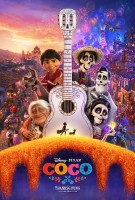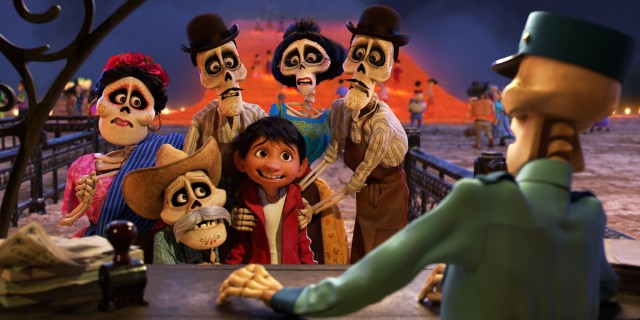Coco Movie Review
 |
Coco
Theatrical Release: November 22, 2017 / Running Time: 109 Minutes / Rating: PG Director: Lee Unkrich; Adrian Molina (co-director) / Writers: Adrian Molina, Matthew Aldrich (original story & screenplay); Lee Unkrich, Jason Katz (original story) Voice Cast: Anthony Gonzalez (Miguel), Gael García Bernal (Héctor), Benjamin Bratt (Ernesto de la Cruz), Alanna Ubach (Mamá Imelda), Renée Victor (Abuelita), Jaime Camil (Papá), Alfonso Arau (Papá Julio), Herbert Siguenza (Tío Oscar, Tío Felipe), Gabriel Iglesias (Clerk), Lombardo Boyar (Plaza Mariachi, Gustavo), Ana Ofelia Murguía (Mamá Coco), Natalia Cordova-Buckley (Frida Kahlo), Selene Luna (Tía Rosita), Edward James Olmos (Chicharrón), Sofía Espinosa (Mamá) |
For about twenty years, a Pixar movie was an annual tradition. Almost every November and then virtually every single June, a new movie from the Emeryville, California-based animation studio would be released and wow critics and moviegoers alike. Now, Pixar no longer makes us wait a full year, but critical and commercial success are not necessarily guaranteed. Sometimes, the movie seems to exist primarily to sell merchandise (this summer's Cars 3). We find both of those elements in Coco, Pixar's first original movie in two years. Coco returns Lee Unkrich to the director's chair for the first time in seven years. A little bit of retrospect has made Unkrich's lead directing debut, 2010's Toy Story 3, seem like the pinnacle of Pixar's absurdly long golden age. In the seven years since that threequel set box office records and earned a Best Picture nomination, the studio has had some generally liked if not quite loved triumphs (Finding Dory, Brave, Monsters University), one film that most would agree is at least in contention of "masterpiece" status (Inside Out), and some perplexing, unprecedented misses (Cars 2 & 3 plus the aforementioned Good Dinosaur). With Unkrich at the helm, a long development period evidently devoid of dramatic overhaul, and a promising new story, Coco inspires more hope and excitement than a number of Pixar's recent sequels and spin-offs.
Coco is steeped in the culture of Mexico, something that has featured surprisingly little in American cinema and almost never in a tasteful or enlightening way. The film is centered largely on Dia de los Muertos, Mexico's Halloween, an occasion used to remember deceased loved ones. Coco opens on that holiday, with a mystery that seems much too obvious to be a mystery. Our protagonist, twelve-year-old Miguel (voiced by Anthony Gonzalez), comes from a traditional Mexican family, one that uses an ofrenda to remember generations past all the way back to Miguel's great-great-great grandparents, whose daughter Coco is now very old, wrinkled, and losing her mind.
Miguel's family is completely against music, a stance that dates back to the prologue story he relays in which Coco's father left the family to pursue his musician dreams. His head is ripped off the photo on the board and he is never spoken of, but everyone else in the family forbids playing or associating with music while running a shoemaking business. Secretly, Miguel is drawn to music, having his own sanctuary to Ernesto de la Cruz, a beloved folk singer of the '30s and '40s who is still celebrated as a national icon. It doesn't take long for Miguel to figure out what we immediately have: that Ernesto de la Cruz, the troubadour whose movies and performances he studies and memorizes, was actually his great-great-great grandfather.
After getting in trouble for his own musical ambitions, Miguel breaks into the mausoleum of the late de la Cruz to use his guitar to enter a contest. The crime has dramatic consequences for the boy. Suddenly, he is invisible to the living, who walk right through him Patrick Swayze in Ghost-style. Miguel is visible to the dead, though, the lively skeletal figures who seize Dia de Muertos as the one day they can travel to the mortal realm and see the loved ones they left behind. The only catch is that they have to have their photos on display by their loved ones, something that is put to the test by a TSA-like screening process.
Miguel meets up with his deceased ancestors and with Héctor (Gael García Bernal), a sly con man who tries to sneak past the screeners by dressing up like Frida Kahlo. Hector, whose existence is threatened by his descendants forgetting him, promises to get Miguel in to see the one and only de la Cruz (Benjamin Bratt), who hosts a lavish shindig like no other but requires an invitation for entry. Miguel gets an opportunity to meet his hero and, with the help of some skeletal makeup applied by Hector, a chance to perform for the deceased and renders his musician claims legitimate. To say any more would be to spoil twists you should not see coming.
It's tempting to call Coco a return to form for Pixar. After all, this sees the studio doing what they do best and so much better than the rest: creating a universe from the ground up and populating it with colorful characters, comedy, and adventure. With sequels and spin-offs suddenly featuring so prominently in the schedule of a company built on original storytelling, it's refreshing to see Unkrich, co-director Adrian Molina, and their two fellow credited writers introducing all-new characters instead of recycling and revisiting ones already embraced by audiences. That makes Coco a harder sell but also a more rewarding one. This does not immediately recall earlier Pixar works or other animated films. There was that 2014 movie The Book of Life that not a lot of people saw, myself included, but that some have drawn comparisons to. But Coco certainly stands out in the sea of talking animal buddy comedies/rescue adventures that most major studio animated features can be categorized as.
Coco doesn't reach the heights of Pixar's best films, perhaps because it is so fixated on doing right by the culture it depicts. That's an admirable goal for a nation rarely dramatized and In addition to succeeding on the most important measures of story and character, Coco also evokes marvel on a technical level, something even lesser Pixar films can fall back on. Coco is a feast visually and makes you contemplate what Pixar would have to do to earn Oscar nominations in Production Design and Cinematography. In those two fields, Pixar blows away nearly all of the live-action competition but the all-digital nature of their work disqualifies them from such awards consideration in most voters' minds. As you could tell from its marketing campaign, Coco bursts with color and life. The skeleton characters allow animators to get creative with classic cartoon sight gags we rarely get in Pixar's work. Shots are packed with such detail that you can't help but take it all in with wonder and awe, even if you're seeing it in vibrant 2D like I did.
Inside Out is the only Pixar film to earn a nomination in the Best Animated Feature category in the past five years, with Monsters University, The Good Dinosaur, and Finding Dory all missing out. I suspect Cars 3 will miss the cut as well, as its immediate predecessor did. Suddenly the award that Pixar dominated for most of its first ten years in existence has become a playground where Disney's age-old animation department is king. This year, though, Disney doesn't have a release and Coco seems certain to grab a nomination based on timing, modest competition, and a presumably strong reception. Personally, I still prefer The Lego Batman Movie and not even just as a consolation for The Lego Movie's head-scratching snub from the category back in 2014. Even if Coco doesn't take the Animated Feature Oscar (and history and odds are in its favor), the film could vie for the Best Original Song award, with original compositions by the Frozen/Avenue Q couple Kristen Anderson-Lopez and Robert Lopez featuring more prominently than music in any previous Pixar film.
In theaters, Coco will be preceded not by an original Pixar short, but by Olaf's Frozen Adventure, a 21-minute cartoon Disney Animation developed for television but decided to give theatrical release to instead. Unfortunately, it was not included in my early November screening.
|
Related Reviews:
DVDizzy.com | DVD and Blu-ray Reviews | New and Upcoming DVD & Blu-ray Schedule | Upcoming Cover Art | Search This Site
DVDizzy.com Top Stories:
2017 Animation: Cars 3 • The Lego Batman Movie • The Lego Ninjago Movie • Rock Dog
Finding Dory • The Good Dinosaur • Inside Out • Monsters University • Brave
Toy Story 3 • Up • Cars 2 • Cars
WALL•E • Ratatouille • The Incredibles • Finding Nemo • Monsters, Inc. • Toy Story 2 • A Bug's Life • Toy Story
Pixar Shorts, Vol. 1 • Pixar Shorts, Vol. 2 • Toy Story of Terror! • Toy Story That Time Forgot
Kubo and the Two Strings
Now in Theaters: Wonderstruck • Wonder • Lady Bird • The Man Who Invented Christmas • Justice League
Text copyright 2017 DVDizzy.com. Images copyright 2017 Disney and Pixar.
Unauthorized reproduction prohibited.

